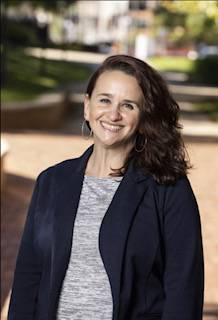
Grand Valley State University
Grand Valley Professor Annie Whitlock is president-elect of the Michigan Council for Social Studies.By ANISH TOPIWALA
Capital News Service
LANSING – Social studies and civics educators across the state have been advocating greater engagement for students with civics in light of the upcoming election.
According to a study by The Hill, a Washington, D.C., newspaper that covers national politics, only half of 18-19-year-olds who voted in the 2020 presidential election say they’ll vote in November.
And a 2023 American Bar Association study of civic literacy found that 53% of those surveyed are not well-informed about how government works.
Educators say the lack of understanding and engagement with government originates at an early age.
“It’s never too early to start learning about this, and it starts really young with just talking to students about how people make decisions,” said Annie Whitlock, a Grand Valley State University professor and president-elect of the Michigan Council for Social Studies.
“How people work together in a group. How all of us have a responsibility towards our community,” she said.
Whitlock said that in this pre-election period, the Council for Social Studies is urging school administrators and the Legislature to increase their attention on social studies education at the elementary school level.
That’s in response to a decline in social studies engagement among students and teachers.
“It’s decreasing, particularly with young students, which certainly can be problematic if they get older and lack the kind of foundational knowledge in civics, among other social studies disciplines,” Whitlock said.
Before becoming a professor of history and social studies at Grand Valley, Whitlock was a middle school teacher.
Whitlock uses her experience in middle school to identify gaps in early education regarding social studies and advocate for improvements.
“I saw firsthand how capable young students are at discussing important issues and learning complex social studies topics,” Whitlock said. “We don’t need to necessarily be afraid to talk about it with young kids.”
The executive director of the Michigan Center for Civic Education, Ellen Zwarensteyn, also said that students are eager and ready to learn and engage in civics.
“The teachers, however, in this climate tend to be more fearful for their own livelihoods because they see what happens at school board meetings that become contentious, or they are concerned about being misconstrued in a classroom environment,” Zwarensteyn said.
Zwarensteyn said administrators have similar fears, feeling both unequipped and not empowered to educate children about civics.
“It’s not their fault,” Zwarensteyn said. “There’s been systematic defunding of civics education for a while now.”
The Center for Civic Education also educates students through its own programs. One is We the People, which engages students in discussions about the Constitution and allows them to participate in simulated congressional hearings.
The program targets middle to high school students.
Zwarensteyn said the organization is bringing the program to more students in grades four through eight.
The center also helped to found another group working to improve civics education, the MiCivics Coalition.
The coalition collaborates with organizations across the state to further civics education through education, outreach and policy.
Whitlock said, “It’s important to realize that our students are bringing in a lot of wealth of knowledge already.”
“We have to go from the assumption that our students are probably willing to talk about it,” she said. “We can help them figure out how to make sense of what they want and encourage them to think critically about what they’re seeing.”